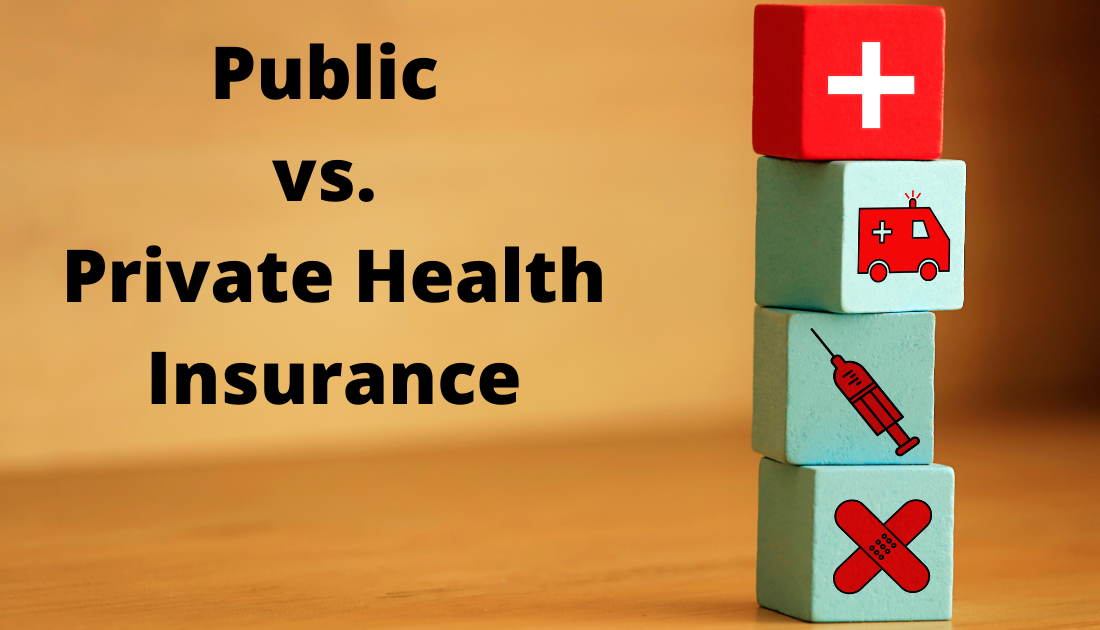Public vs. Private Health Insurance

Just the Essentials...
- Health insurance, whether public or private, is designed to help you keep your medical care expenses at manageable costs.
- Public and private health insurance both have their share of pros and cons.
- No matter which type you choose, health insurance is a very important commodity to have. To this day, there’s still a debate regarding which type of health insurance is better for overall healthcare and managed costs.
Understanding Public vs. Private Health Insurance
Health insurance, whether public or private, is designed to help you keep your medical care expenses at manageable costs. The question of which type is right for you is subjective. Public and private health insurance both have their share of pros and cons.
No matter which type you choose, health insurance is a very important commodity to have. Certain countries, such as Canada, France, or Great Britain, offer public health insurance only. Most countries offer both. To this day, there’s still a debate regarding which type of health insurance is better for overall healthcare and managed costs.
Believe it or not, it’s easy to find a health insurance plan that works best for the needs of you and your family. Start comparing plans today by entering your zip code into our FREE comparison tool above!
Differences in Public vs. Private Health Insurance Cost
One of the biggest differences between public and private health insurance is the cost to purchase a plan. Public health insurance is largely considered to be care that’s free for everyone, while it’s known that in order to enroll in and keep a private health insurance plan, you must pay a monthly premium.
Public health insurance plans are run by a country’s government. In America, Medicare and Medicaid are the two best-known examples of public health insurance. These types of plans are funded by taxpayer dollars, and in most countries, those tax payments allow you access to health and medical care. For some forms, such as Original Medicare*, a premium is paid monthly to maintain enrollment.
Private health insurance plans are run by individual insurance companies. The cost of your monthly premium depends heavily on the types of services your plan will pay for. Depending on the type of plan you choose, you may pay a great deal more for private health insurance than public.
*Original Medicare consists of two parts - Medicare Part A and Medicare Part B. Most individuals who enroll in Medicare Part A will get it for free. However, even if you get Medicare Part A for free, you will still have to pay a monthly premium for Part B.
Health Insurance Plan Features
Public health insurance is designed so that beneficiaries will not have to pay out of pocket for crucial medical services. It doesn’t matter whether you have pre-existing conditions or not, the cost of your healthcare plan remains affordable without barriers.
Private health insurance has a wider variety of options, but those options affect your premiums. With the passage of the ACA, you cannot be denied coverage if you have a pre-existing condition, but private companies may choose whether or not they cover certain issues. If you have a chronic illness or require care for a long-term debilitating injury, you’ll likely end up paying a very high premium for your insurance.
How Insurance Companies Cut Costs
To keep their programs running, public and private health insurance companies make cost cuts as a way of both saving and making money. Public insurance companies reduce costs by cutting the salaries of administrators or healthcare workers. This is done in an effort to make sure all citizens are able to get the care that they need.
Private health insurance companies cut costs in other ways. For instance, they charge those who are more susceptible to illness or in poor health higher premiums than individuals who are healthier. They may also increase your premiums after you file a health claim. These practices help private health insurance companies keep their overhead fairly low.
Understanding Quality of Care
If you have a private health insurance plan, the quality of care you receive is typically related to two factors:
- The type of plan you have.
- The amount you pay for your monthly premium.
If you do not have health insurance, or you have a basic plan, you will get very little, if any, treatment.
Those who have exclusions on their policy may not get access to the care they need unless they’re able to pay for it on their own. On the other hand, if you’re fairly healthy and have an expensive policy, the quality of treatment you receive will be higher. If you want better-than-adequate treatment, it’s not a good idea to go with a policy because it has lower premiums than another.
Public health insurance plans allow citizens access to adequate care. However, any quality of healthcare that goes above and beyond that may be lacking. Countries which offer public health insurance only often have waiting lists for certain types of medical procedures, and some of those lists can be very long. Overall, this can lead to poorer health for many.
Public vs. Private Health Insurance: The Big Debate in the United States
One of the biggest debates regarding healthcare in the United States as of late has been over the accessibility of health insurance for all. The cost of private health insurance has risen a great deal in the past several years, which has led leaders in Washington to discuss health insurance reforms. A public healthcare option has been a constant on the table.
Currently, there are some states that offer public insurance plans in addition to the option of private health insurance. If you don’t live in a state that currently offers public health insurance, you still have options. Enter your zip code into our FREE plan finder below to begin comparing health insurance plans today!
